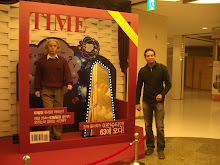


 A governement-initiated project that started in 2004 and will take until 2023 to complete, the Hub City Culture centers upon Gwangju, one of Korea's six major metropolitan centers. The leading city of the nation's southwestern area, Gwangju is historically known as a home of justice, the arts and education.
A governement-initiated project that started in 2004 and will take until 2023 to complete, the Hub City Culture centers upon Gwangju, one of Korea's six major metropolitan centers. The leading city of the nation's southwestern area, Gwangju is historically known as a home of justice, the arts and education.A City of justice
Most Asian countries share painful experinces of colonialism and dictatorship in the course of modernization. From the Donghak Revolution in the nineteenth century to the May 18 Democratic Uprising in 1980, Gwangju has come through a long tunnel of hardships and in the course acquired a noble power to overcome the past. Now Gwangju stands at the center, ready to restore Asian pride and realize the diversity of Asian cultures.
A City of Arts
Gwangju has always been a center for traditional Korean art and culture; it cherishes the archetype of Korea's ' southern culture', the wit and satire manifesting the spirit of resistance. In addition to many eminent figures of modern/contemporary literary and artistic circles, the city also takes pride in hosting the Gwangju Biennale, one of the most influential art festivals in Asia. Gwangju's abundant cultural assets can give the city global recognition in addition to national importance.
A City of Education
Gwangju boasts creative, well-educated human resources in the fields of art, culture and information technology, the perfect ingredients for the city's growth into a competitative cultural hub.
The Hub City of Asian Culture
The Hub City of Asian Culture, Gwangju will work to promote the exchange of diverse cultures and resources of Asia, bring about the co-prosperity of Asian nations, and help make Korea a medium for communication, openness and balance between Eastern and Western cultures.
Experience of Gwangju
One of my friends, Robi who is a experimental artist of Bangladesh invited me to visit his studio in Gwangju. I cannot remember the exect date, may be it was between November and December in 2007. He came to Korea by getting invitation of 'The Art Council of Korea'. I stayed for two days in his studio. The studio's location was inside of the mountain. The place was very calm and perfect for artistic people. It was very nice feeling to hear the sound of flowing water, windy leaves, whisper of the birds. I was remembering William Wordsworth 's poem' 'Under the greenwood tree' . You can find love and peace under the nature. Actually, there are many important things of life, we can learn from nature. That is why, may be some Philosophers such as Rabindranath Tagore, (রবীন্দ্রনাথ ঠাকুর), Bertrand Arthur William Russell etc. suggested that "Education through nature". I am totally agree with their educational philosophy. Human can make them real human by getting the touch of nature what I belive always.
Anyway, we tried to look around the mountain. After enjoying with nature, I went with my friend to see the city life. The city life of Gwangju is not much crowded like Seoul. There were not any traffic, not many people on the street. I had some chances to talk with local people there. I tried my best to use my few knowledge of Korean language. Anyhow, I was able to communicate with them. There were very friendly and flaxible. After staying two days' inside the nature, it was very hard for me to come back to Seoul and to start my mecanized life again.
Now,I am waiting for that day, when I will get chance again to visit that hub city of asian culture, Gwangju.




No comments:
Post a Comment